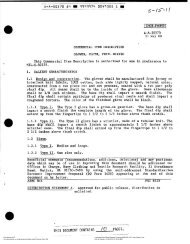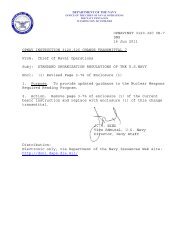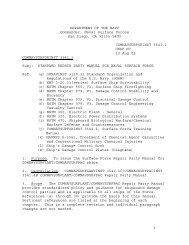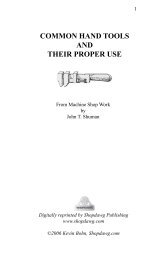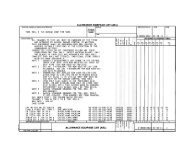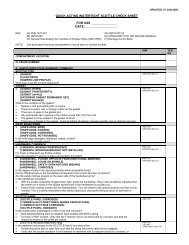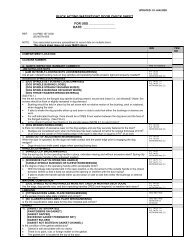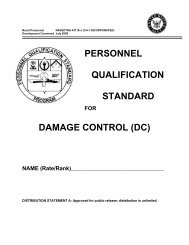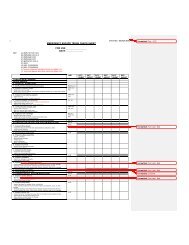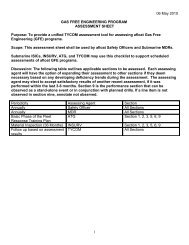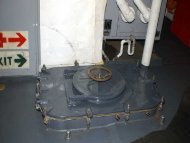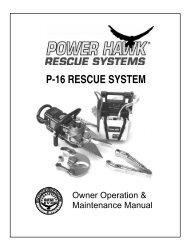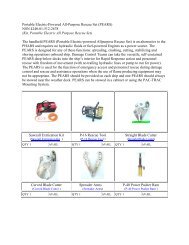JOINT FLEET MAINTENANCE MANUAL
JOINT FLEET MAINTENANCE MANUAL
JOINT FLEET MAINTENANCE MANUAL
Create successful ePaper yourself
Turn your PDF publications into a flip-book with our unique Google optimized e-Paper software.
COMFLTFORCOMINST 4790.3 REV A CH-1<br />
2.9.2.2 Industrial Activity Training. The Industrial Activity/FIT will provide familiarization training in accordance<br />
with the shipbuilding contract on ship's characteristics and systems. This training generally is not sufficient for<br />
"System Expert" qualification, but will provide an excellent opportunity for School of the Boat/Ship, and at the same<br />
time provide an opportunity for Divisional Training Petty Officers to develop a more detailed and in depth training<br />
program. In most cases the Industrial Activity will allow the ship to control the scheduling of topics.<br />
2.9.2.3 Fleet Training Center. Surface ships utilizing the Pre-Commissioning Detachment Concept at a Fleet<br />
Training Center (FTC), either in Norfolk, VA or San Diego, CA, are provided with an outstanding opportunity to<br />
ensure pipeline training is obtained. This concept also provides for the easy access to many of the basic courses<br />
such as firefighting, damage control, Repair Parts Petty Officer training, Drug and Alcohol Program Advisors,<br />
Component Change Control, etc., which are needed to ensure assigned personnel can effectively function as a ship's<br />
crew upon delivery. For ships not utilizing the FTC Detachment Concept, such as submarines, an individual should<br />
be assigned to monitor and track training and manning issues as they develop.<br />
2.9.3 Ship's Qualification Program. The implementation and operation of the Ship's Qualification/Personnel<br />
Qualification Standard (PQS) should ensure a logical process for training Ship's Force for watchstanding and ship's<br />
qualification. TYCOM instructions that cover Ship's Qualification/PQS requirements are found in references (q), (r)<br />
and (s). The department organization manual should establish prerequisites for watchstander qualification.<br />
Qualification goals should be established and the program should support completion of goals within each division.<br />
Fleet wide training and qualification goals are:<br />
a. Underway Watchbills; 3 Section Enlisted, 4 Section Officer/Chief Petty Officer.<br />
b. Inport Watchbills; 4 Section Enlisted, 5 Section Officer/Chief Petty Officer (6 Section for all personnel<br />
on Aircraft Carriers).<br />
2.9.4 Deficiency Identification and Correction. The establishment of procedures by which Ship's Force reports and<br />
tracks the correction of deficiencies cannot be overstressed. The Supervising Authority relies heavily upon PCU<br />
involvement to augment their efforts. Inspections of systems, equipments and spaces by PCU personnel are<br />
extremely important in the identification of unsatisfactory work and/or material deficiencies. Each shipbuilder and<br />
associated Supervising Authority have their own established system for tracking shipbuilder responsible<br />
deficiencies. Those deficiencies which are not corrected during the construction cycle will be submitted to the<br />
INSURV Board just prior to FCT, AT or CT (the type of trial dependent on platform). These deficiencies,<br />
depending on their seriousness, may impact a ship's delivery to the Navy. Deficiencies cited must either be<br />
resolved/corrected or waived by the Ship Program Manager.<br />
2.9.5 Establishment of Engineering/Reactor Department. This paragraph addresses the Engineering/Reactor<br />
Department establishment and tasks which are to be accomplished during the pre-commissioning phase of new<br />
construction. The tasks defined in this section incorporate experience gained and lessons learned from previously<br />
completed ships. The objective is to provide guidance which will assist in the ship's readiness, from an<br />
Engineering/Reactor Department standpoint, to successfully complete contract milestones and to prepare for fleet<br />
introduction.<br />
2.9.5.1 Requirements. The PCU should monitor and report on the ship's construction progress to the PCO, and<br />
dependent upon platform, conduct and/or witness and participate in the ship's dockside and at-sea testing, attend<br />
periodic documentation reviews, assessments, and validations, and provide recommendations regarding manpower,<br />
training, watchstanding and related shipboard engineering requirements. Tasks and responsibilities include items<br />
discussed in the following paragraphs.<br />
2.9.5.2 Shipboard Inspections. Shipboard inspections by the ship's Engineering/Reactor Department and cognizant<br />
Supervising Authority personnel are necessary during the ship construction phase. There is no precise pattern or<br />
timetable for these inspections, but they should be thorough and conducted frequently. Ship's Force personnel need<br />
to become familiar with the contract specifications and system drawings. This will ensure the prompt identification,<br />
and documenting, of discrepancies discovered when comparing "as built" conditions to the actual specification.<br />
I-2-21



